THE BILINGUAL BRAIN - Does speaking two or more languages make you smarter? | BENEFITS
Summary
TLDRThe video script explores the concept of bilingualism, highlighting its practical benefits in a globalized world and the psychological and social advantages it offers. It distinguishes between compound bilingualism, where two languages are learned simultaneously, and coordinate bilingualism, where languages are learned separately in different contexts. The script also touches on the cognitive benefits of bilingualism, such as delayed onset of age-related mental issues and enhanced brain connectivity, encouraging viewers to embrace language learning regardless of their background.
Takeaways
- 🌐 Bilingualism is perceived differently, with some considering fluency and others perfect pronunciation as the key criteria.
- 🌍 Speaking multiple languages offers practical benefits in a globalized world, including ease in travel, job opportunities, and business.
- 👶 Compound bilingualism, also known as additive bilingualism, occurs when a child is raised in two languages simultaneously, often leading to code-switching.
- 📚 Coordinate bilingualism, or subtractive bilingualism, is when a person learns and uses two languages separately in different contexts, as the speaker exemplifies with Russian and Portuguese.
- 🏠 Home environment plays a crucial role in language learning, influencing which language is associated with personal and familial contexts.
- 🗺️ Monolingual countries like the US, England, and Australia still have a significant multilingual population, reflecting the global trend towards multilingualism.
- 🧠 Bilingualism may delay the onset of age-related cognitive decline such as dementia and Alzheimer's by up to 4 years.
- 📉 Bilingual adults have denser gray matter in the brain compared to monolingual adults, suggesting a neural advantage.
- 💡 While bilingualism doesn't make one more intelligent, it does enhance cognitive skills and brain connectivity.
- 🚀 Learning a new language at any age is beneficial, acting as a mental workout to improve overall cognitive function.
Q & A
What are the differing opinions on what constitutes bilingualism?
-Opinions vary; some believe bilingualism means speaking two languages fluently with ease, while others require perfect pronunciation and minimal grammatical errors for a person to be considered bilingual.
What are the practical benefits of being able to speak two or more languages in a globalized world?
-Multilingualism offers advantages such as watching movies without subtitles, having fewer issues while traveling, and increasing job or business opportunities, especially in tourist areas.
What are the two types of bilingualism mentioned in the script?
-The two types are compound bilingualism (also known as additive bilingualism) and coordinate bilingualism (also known as subtractive bilingualism).
How does compound bilingualism typically occur?
-Compound bilingualism happens when a child is raised by bilingual parents who use both languages at home, allowing the child to learn and grow into both languages simultaneously in the same environment.
What is the characteristic of language use in compound bilingualism?
-In compound bilingualism, people often do not see the two languages as separate and may use words from different languages in the same sentence to express themselves better.
How does coordinate bilingualism differ from compound bilingualism?
-Coordinate bilingualism involves perceiving the two languages as separate, as the person learns them in different environments and contexts.
Can you give an example of coordinate bilingualism from the script?
-The speaker is an example of coordinate bilingualism, studying in Russian and using it mainly in the college environment, while using Portuguese with friends and family.
What is the significance of the term 'gray matter' in the context of bilingualism?
-Gray matter is a type of brain tissue that is denser in bilingual adults compared to monolingual adults, suggesting that bilingualism may contribute to a healthier brain.
How does bilingualism potentially impact age-related mental issues?
-Bilingualism can slow the advance of age-related mental issues such as dementia and Alzheimer's disease by up to 4 years.
Does speaking more than one language necessarily make a person more intelligent?
-While speaking multiple languages does not necessarily make a person more intelligent, it does stimulate and increase brain connections, improving cognitive skills.
Is it ever too late to start learning a new language, according to the script?
-No, it is never too late to start learning a new language, even if one grew up in a monolingual environment.
Outlines

This section is available to paid users only. Please upgrade to access this part.
Upgrade NowMindmap

This section is available to paid users only. Please upgrade to access this part.
Upgrade NowKeywords

This section is available to paid users only. Please upgrade to access this part.
Upgrade NowHighlights

This section is available to paid users only. Please upgrade to access this part.
Upgrade NowTranscripts

This section is available to paid users only. Please upgrade to access this part.
Upgrade NowBrowse More Related Video

Qué pasa en el cerebro si hablas varios idiomas

Why You Talk the Way You Do – and What It Says About You

The benefits of a bilingual brain - Mia Nacamulli

Why being bilingual is good for your brain | BBC Ideas

Top 6 Benefits of Being Bilingual from Childhood: advantages of bilingualism and bilingual education

No Excuses The Power of Self-Discipline by Brian Tracy Audiobook | Book Summary in Hindi
5.0 / 5 (0 votes)